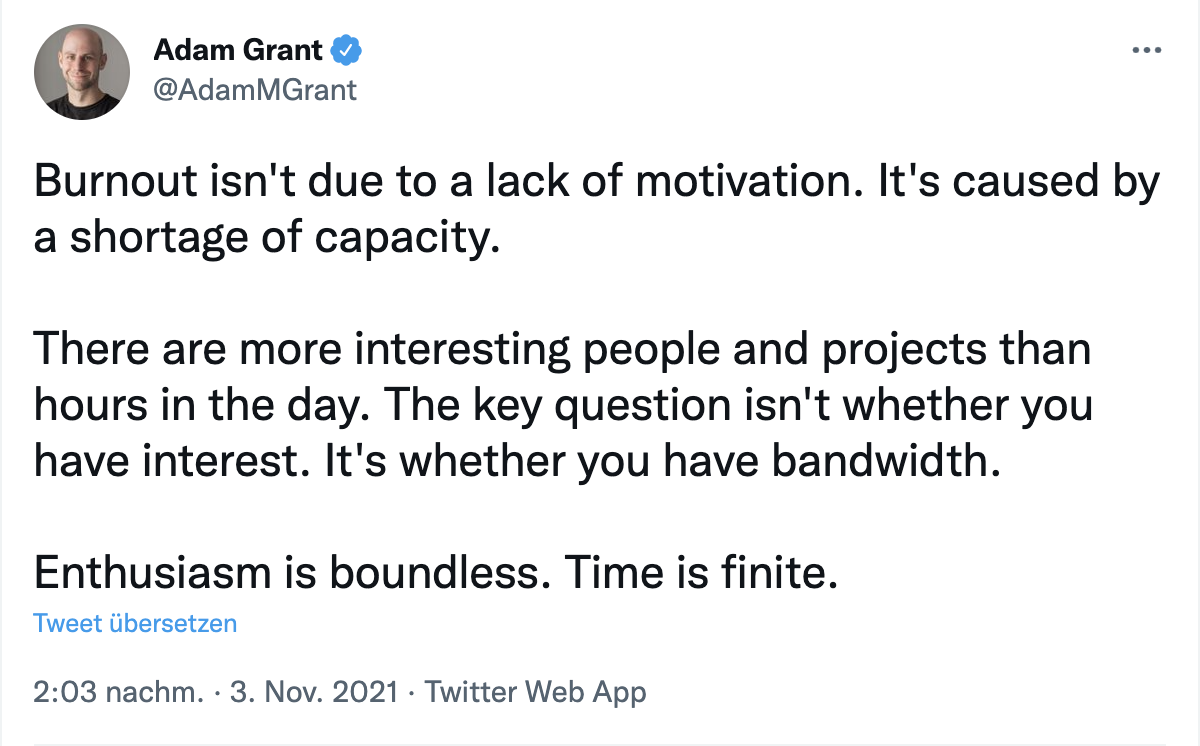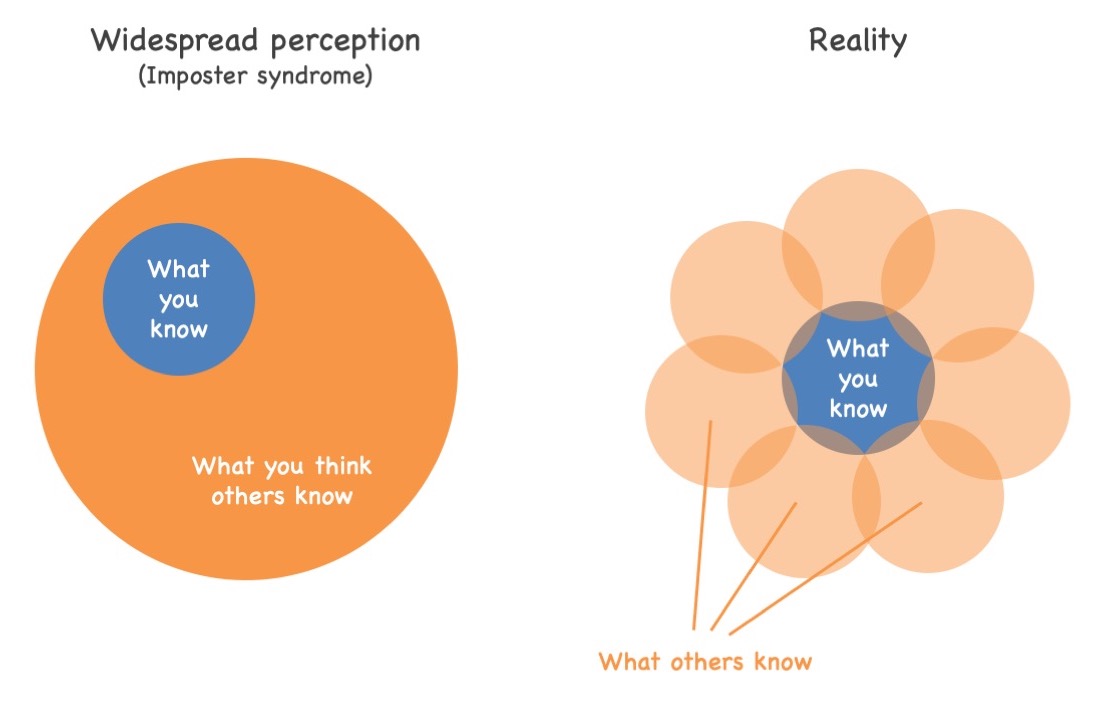Leaving the rat race - Part 5
How to leave the rat race

Leaving the rat race - Part 5
In the previous post we discussed the actual strengths of humans and how the FOMO 1 cycle tends to play against it.
In this post, I will give a few recommendations how to deal with the hype industry and leave the rat race.
Recommendations
Constant FOMO does not feel good. And as we have seen, the constant flood of “innovation”
- is not real innovation.
- does not solve the problems they claim to solve but merely distracts from the actual problems.
- stresses people and leads to response patterns (especially hyper-specialization) that work against the strengths of humans.
This means, for most people it would be advantageous to leave the rat race, to break out of the FOMO cycle.
I do not claim to have the perfect solution for this problem. I also struggle with it from time to time. Still, I would like to give a few recommendations that at least helped me – and hopefully will also help you a bit:
- You do not need to know everything
- Beware of the cult of (nerdy) details
- Curb your engineering curiosity (at the right places)
- Do not fall for hypes
- Learn to spot the (rare) real innovation
Let us go through them one by one.
You do not need to know everything
Really, it is perfectly fine not to know everything, not to be an expert in everything. Actually, it is impossible. You can only cover a certain width and depth of knowledge. The area, an individual can cover may differ depending on the individual, but no matter how smart you are: The area you can cover is limited. You need to cut off somewhere.
If you do not cut off in a responsible way, you most likely will burn out over time. Adam Grant recently posted this tweet which I think nicely describes it:

We can argue if this is the only cause of burnout. Probably, it is not. But I think it definitely is a relevant source of burnout in IT: If you try to cover a broader area than you can over a longer period of time, you will burn out eventually.
Often, the urge to know more than you can cover is caused by the fact you think, other people know more than you do. As an antidote to this widespread impression I can offer the following picture, I took from a tweet by Bryan Biermann:

You do not know less than other people. You just know different things. And do not project the union of the knowledge of other people on every single one of them. They may be smart. But they are not that smart. Talk to them for a while about a wider range of topics if you have the chance and you will be surprised to realize that you typically know a lot of things they do not know. You just also need to observe the things you know, not only the things you do not know.
Hence, relax!
Beware of the cult of (nerdy) details
Especially in the developer community, I observe the tendency to admire people who know the oddest details, often considered “nerdy” (with a positive attitude). E.g., people who know tons of details about the JVM garbage collector are often admired: “Look at all the stuff they know. I had no idea of that. How smart they are!”
Well, yes, those people probably know a lot about the JVM garbage collector. But if you take a step back, you should ask yourself what this knowledge is good for unless you are one of the few experts needed to help companies to fix memory usage problems with the JVM. If we look at the union of problems we typically face when creating software solutions using a JVM-based language, fixing garbage collector issues is way down the list.
This does not mean that we do not need any of those experts. There are situations we need this knowledge. But the situations are very rare.
The key point is to understand that if put all this knowledge in your brain, it will block capacity that is not available for other knowledge anymore. Thus, think at least twice before trying “to be like them”.
Talk to those experts if you have the opportunity. Sure, they are smart people. But so are you. You will realize that while they are indeed experts regarding the JVM garbage collector (to stick to our example), they most likely do not know a lot about some different area of expertise you know a lot about. Sometimes, these experts even would be of little help in your project team – unless there is a JVM garbage collector problem to solve.
Thus, beware of the widespread cult of details in the developer community. Understand that experts who know all these details only know them because they decided to cover a different area of expertise than you chose.
To be clear: I do not want to diminish these experts. We need them and if you have the opportunity to listen to a talk from those experts or read an article from them: Do it. Enjoy it. It often is fun. Sometimes it is even mind-blowing.
But do not start to admire them for their detail knowledge and belittle yourself. You just chose to cover a different area of knowledge. That is all.
Hence, relax!
Curb your engineering curiosity (at the right places)
Engineers are curious. At least, most engineers I have met are curious. We are always interested in new ideas, concepts, tools and technologies. Probably, it is also one of the driving forces why we are so easy prey for the hype industry.
And curiosity is good. It drives our evolution, our progress. Without curiosity, we would not grow.
But too much curiosity will backfire, too. Too much curiosity means we either get lost in the myriads of things we are interested in and build only superficial knowledge at best or we constantly feel overstrained. As most things, curiosity has its sweet spot. More is not necessarily better.
Too little curiosity is harmful for a good software engineer. Too much curiosity is harmful, too.
Find your balance!
Do not fall for hypes
You probably heard it multiple times from your parents while growing up: “If everybody was jumping off a cliff, would you?”. And probably you rolled your eyes and sighed because you had the feeling your parents did not understand at all, why this particular thing was so important to you.
Maybe quite some years later you remember the discussion and realize that maybe your parents understood you better than you thought they do. Maybe they saw you blindly running after a fashion just because your friends or classmates ran after it and tried to protect you from it – probably not the smartest way trying to protect a teenager, but they tried.
The point is that hypes often exert an urge on people to follow them: If everybody is (or seems to be) running, I must run, too. This is part of human nature. We want to belong to the group. And if the group seems to be running in a certain direction, we feel the urge to follow it.
The problem is that marketing and advertisement ruthlessly and often perfidiously exploit this human need. They try to give you the impression that “everyone is doing it” and you will be isolated from the crowd if you do not buy the offering they advertise.
Admittedly, it takes some mental strength to withstand this perceived urge to “follow”. I also still struggle from time to time.
But if you start to follow my first three recommendations, it will become easier over time. As you internalize that you do not need to learn everything that is out there, you also become more aware of the marketing and advertisement tricks, companies use to drive you into buying their offerings – also useful outside the world of IT, btw.
Learn to spot the (rare) real innovation
We already discussed in the second part of this blog series that most of the so-called “innovation” in IT is not real innovation. It neither changes the way IT is used nor does it change the way we use IT in a significant way. At best, most of the so-called “innovations” are small evolutions. Most of the times, they are not even that.
Knowing this makes it a lot easier to suppress the urge to run after every novelty on the horizon. You will start looking at all those “innovations” in a much more critical way and this is good. It becomes harder for others to put anything over on you.
Still, a few real innovations remain that are worth being observed closely and picked up eventually. The problem is to spot them because usually real innovations start without big marketing campaigns and often are hard to identify due to all the constant puffery noise made by the hype industry.
If I observe something novel, I tend to ask myself how this thing could be used in combination with other things, if new potentials arise or not. Doing that I do not spot all innovations (and sometimes I spot innovations that will still take years to become ripe), but it helps.
Most disruptive innovations are not something completely new but a novel combination of things that already exist. If you keep that in mind, it will become easier for you over time to spot real innovations that are worth observing and picking up and distinguish it from the omnipresent puffery.
Summing up
These were a few recommendation of mine how to leave the rat race. As I wrote above, they are not a panacea and from time to time I still struggle with FOMO myself. But it became better and hopefully those recommendations will also help you to take a more relaxed position in face of the hype industry.
In the next and final post of this blog series, I will add a few ideas how to use your time in a more useful way instead of running the rat race. Stay tuned … ;)
-
FOMO: Fear of missing out. The fear of missing the “next big thing” – see also the first post of this blog series. ↩︎






Share this post
Twitter
Google+
Facebook
Reddit
LinkedIn
StumbleUpon
Pinterest
Email